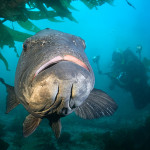The present dialogue on marine conservation is failing our oceans. It isn’t just a science/public communication fail – missteps are happening in a variety of ways. But right now I’m particularly talking about you, The Economist, and your imminent World Oceans Summit, attended by the glitterati of industry and the global economy.
Timing is Everything
If you were going to schedule a forum aimed at spurring progressive change in ocean conservation, when would be the absolute worst time to commence said event? This week, perhaps, during the world’s BIGGEST ocean sciences meeting – the 2012 Ocean Sciences Meeting in Salt Lake City? Cue our first #epicFAIL courtesy of the Economist World Oceans Summit, happening next week in Singapore.
The Economist summit has pumped itself up as follows:
The world’s oceans are the setting for increasing economic activity and will continue to be so for years to come. Only in recent years have scientists begun to understand the significant impact of this growing industrialisation on the ecosystems of the seas and, by extension, on the broader biosphere we all inhabit. Now is the time to engage the global business community and change the nature of the debate.
The Economist’s World Oceans Summit will examine how the increasing activity in and around the oceans can be managed sustainably and what this means for business and other key stakeholders. Chaired by John Micklethwait, Editor-in-chief of The Economist, the summit will bring together more than 200 global leaders from various sectors and disciplines, including government, business, international organisations, NGOs, think-tanks and academia to participate in a unique, outcome-driven dialogue.
At DSN we’re all shaking our heads in disbelief–the bad timing of the Economist summit is simply inexcusable. Many marine scientists couldn’t attend even if they wanted to, and the scheduling conflict means that media attention on ocean issues will be diverted away from any cutting edge science being presented in Utah. Aren’t marine scientists some of the most obvious people you’d want to leverage for promoting change? Shouldn’t any plan for long-term economic sustainability be fundamentally and deeply rooted in scientific data?
“Broader Ocean Dialogue” = a lot of hot air
Transformative initiatives are commonly borne from unconventional collaborations. Fresh ideas often shake the boat. Innovation is an exciting and inspiring thing. But when I look at the scheduled speakers for the Economist summit, I’m not very excited; there are a lot of titles that include the phrase “executive director”.
Even though they’re trying to highlight participation from academia, there don’t seem to be nearly enough scientists attending the Economist summit. The ones that were invited represent a typical lineup of established heavyweights, all of whom have my immense respect and admiration. Yet, this program gives the distinct impression that the Ecnonomist organizers were more worried about prestige and fanfare than inviting up-and-coming scientists and conservationists whose opinions aren’t already widely known. Given that National Geographic is the co-host of this summit, I half suspect that the conversation will be watered down in order to avoid upsetting Rupert Murdoch or anyone at News Corporation (You didn’t know that the National Geographic channel is owned by the same company as Fox News? Or that they will soon be leveraging endangered species for ratings?)
A broader ocean dialogue implies a diverse audience – but who exactly IS the audience for this summit? Who is attending this event apart from the invited participants? On whose ears will their message fall? Amongst the invited scientists, where is the diversity in gender, race, or career stage? For the latter, we would expect the younger generation to have the best answers. This could have been an unprecedented networking and training opportunity for early-career scientists. Researchers like myself are passionate, driven, and willing to do the legwork; but how can we know what needs to be done if we’re not privy to such high-level discussions?
Besides that, there are some significant gaps in the list of attendees. Where are the representatives from developing nations (apart from the President of Kiribati, the token representative it seems)? Where are the small-scale fishers most impacted by catch systems? There’s not even an indigenous representative on the Arctic panel, when the Arctic tribes are the ones most adversely impacted. There’s no Asian representative on the aquaculture panel when Asia (e.g., China, Vietnam) is the biggest consumer and producer of aquaculture products – and the conference is in Singapore! It’s not exactly far to travel!
Major oversight in topics
There were also a lot of topics that were conveniently left out of the program. Shelf and deepwater resource extraction, anyone? Namely, oil drilling and deep sea mining. So far as I can tell this issue is not being discussed at all during the World Oceans Summit. This is quite ironic considering resource extraction is being extensively scrutinized at the Ocean Sciences Meeting, with a long list of sessions and scientific presentations. And have we already forgotten what resulted from the deepwater resource extraction in the Gulf of Mexico? Since these problems relate directly to the activities of international corporations (not “tragedy of the commons”), we at DSN can’t help but suspect this is a deliberate oversight so the corporate partners don’t feel threatened.
Where are the defined outcomes?
Yes Economist, what do you hope to accomplish out of your ocean summit? The scientists you have invited – however important their message – aren’t the ones out in the trenches. Executive directors don’t tend to go sampling or sequence DNA. And where is the cutting edge science? We are in the midst of a post-Genomics era that could revolutionize our capacity to monitor the oceans. How are you going to spur innovation if you aren’t bringing in any fresh ideas or promoting new technology? I know that Jane Lubchenco thinks that social media has an important role to play in conservation – but she doesn’t have a clear vision of the way forward. At DSN we’re trudging ahead in uncharted territory and promoting online tools as a new paradigm for ocean conservation. Shouldn’t scientists like us be a part of the Economist’s conversation? We have the expertise and are willing to work our assess off to make a difference.
Dear Economist, will your summit produce ANYTHING new that you can’t get from, say, the Pew Ocean report?
Even more frustrating, there are working group sessions on the last day, with no solid items slated to come out of them:
The final afternoon of the World Oceans Summit is in many ways the most important and exciting. If we are to tackle the myriad causes of our troubled oceans-the market failures, the irrational economic behaviour, poor governance and so on—we must do so with new and innovative solutions built around enlightened self-interest, and by a multiplicity of stakeholders. The oceans conversation must expand now from the confines of academia, NGOs, governments and international bodies—where much important progress has been made—to businesspeople and boardrooms, where small steps have been taken but bigger steps around innovation and sustainability, and responsible use of the oceans, will bring new rewards and opportunities.
Each of the working groups below will aim to tackle an area where a real difference might be made, and generate ideas for solutions. These are highly interactive sessions, each bringing together the widest group of oceans stakeholders. Thought-provoking case studies of initiatives and innovation, in and out of the oceans, will act as catalysts for discussion, while discussion leaders—experts in their field—will help shape and form the proceedings. The outcomes of each working group will then be relayed at the final plenum.
The focus group conversions will merely be presented to all attendees in yet *another* discussion session. In my experience, the most successful workshops establish solid action points before the end of the event and subsequently follow up on their progress. The present summit might be fine for smaller scale events, but seems grossly inappropriate for such a large supposedly ‘transformative’ event. Everyone might leave the Ocean Summit excited, but then reality will soon take over as the glow fades away–especially for high-level directors whose workload is already bulging at the seams.
Maybe I’m wrong–I sure hope I am. Maybe this summit will indeed be a transformative event. I remain forever optimistic, but perpetually skeptical.






“The scientists you have invited… aren’t the ones out in the trenches.”
Ha! Trenches!
But seriously, would you really expect anything from self-described Very Serious People other than a kneejerk defense of the status quo? Especially the highly profitable, publicly traded parts of the status quo? Hardly.
I really enjoy reading The Economist for its broad coverage of the world, but every issue contains at least one turn of phrase that is so wrong and dishonest I throw the damned thing across the room and swear I’ll never read it again.
Russell
“(You didn’t know that National Geographic is owned by the same company as Fox News?…”
I’m pretty sure this overstates the facts. The magazine and its offshoots apparently still belong to the National Geographic Society; it’s only in its television ventures that the Society has
sold its soulpartnered with Murdoch’s News Corp.Everything else? Appears to be depressingly accurate.
Interesting…the one thing I can definitely say is terrible is their timing, whether that was intentional or not it speaks volumes about how scientists were not consulted. The Economist summit seems to be a gathering purely of political and business leaders with economic concerns foremost under the guise of the green label. While I don’t condone the timing, I feel that something good might come out of this summit…at least I hope so. Please keep us updated on both summits if you can.
Thanks for clarifying the exact nature of the relationship between News Corp and National Geographic; I updated that sentence to specifically refer to the television channel. Russell had also pointed out in an e-mail that the “National Geographic Channel is a joint venture between News Corp and the National Geographic Society, of which News Corp is the majority investor” – you could argue semantics about “owns” vs. “invested in” vs. “partnered”, but regardless your terminology I think the bottom line comes down to the effect that this relationship likely has on the content of National Geographic’s television programming.
The oceans conservation world reminds me of those wooden Russian dolls at times.
You know the ones that look the same and fit perfectly into each other but get progressively smaller along the way?
Thanks for the post. It’s good to shout at the system, especially when the fossilization within that system threatens to overwhelm it.
There is a way forward, but it has to be as nimble, as savvy, and as market driven as those who are working the other side of the equation.
Nat Geo Magazine is trying desperately to distance itself from the television arm.
Unless the television arm comes up with programming they can use like “Shark Men,” which was widely advertised in Nat Geo Mag globally.
It’s a sad footrace between Discovery Networks and Nat Geo television right now, with both media outlets sharing the same production and staffing DNA resulting in programming like Whale Wars, Jimmy The Gator Hunter, and…
OK, with the official preamble that these are my comments only, I have to say this column is unintentionally hilarious. A scientist is upset that they’re not being invited to a non-scientific conference? While I’m delighted that folks like the DSN crowd do believe science can change the world outside one particular journal, that’s not the historical approach. The tweets from Oceans2012 reflect as much, like comments that “scientists shouldn’t advocate” and social media panels from people who don’t use social media. You’re at a conference organized by AGU, ASLO and oceanographers. There are fewer than five policy or communications related panels, and I didn’t see any economists or political scientists. I have a bunch of colleagues who are in Salt Lake and when I asked them if I should join them, they said “it’s really more of a pure research conference.”
The Economist wanted to hold a conference for politicians, investors, economists and businesses, not scientists. That’s whose calendars they consulted. They’re talking about global accounting standards, triple bottom line strategies, full cost estimates and ecosystem services valuations. Just bringing conservation into the boardroom is a big step for a lot of these folks. The Economist conference represents significant progress in reaching folks who might not have otherwise thought conservation was part of their balance sheet.
You didn’t get an invite to the economics party, and you didn’t invite any economists to yours. You’re talking about copepods, and they’re talking about credit guarantees. Neither of these events were intended to be the big tents you’re proposing. That could be a very cool event. But pot, meet kettle.
Hi Kate,
Gotta agree with everything you just said, but this post suggested the following at the outset:
“Transformative initiatives are commonly borne from unconventional collaborations. Fresh ideas often shake the boat. Innovation is an exciting and inspiring thing.”
I read that to be:
“Filling a room with the same old folks, talking the same old talks and patting the same old backs, instead of adding new and unusual DNA to the mix = stagnation and one giant echo chamber of backslapping ninnies.”
O.K so perhaps the backslapping ninnies was mine only, in fact it was, but I am sure you have been to as many single DNA events as I have to realize that we’re generally moving at glacial pace when it comes to the oceans. That pace is born, in my view, from an inability to cross pollinate and move as nimbly as those who are doing the most damage to the oceans.
I come from two worlds, one that makes money from the oceans and one that seeks to protect what we have. Because of that I get frustrated because I can see new ways of doing things, I can identify new markets, and I move at a commercial pace. The same pace those who bring deep water fish to market re-branding them and destroying entire ecosystems in the process.
Can you make a fish sexy and marketable? The answer is yes, it is done every single day. Can you make that same fish a conservation poster child? The answer is generally no, why is that?
The tools are there, waiting.
While these single DNA events cry foul and discuss 1970’s measures to stem the tide, by the time anything is done, these new market fishing fleets have wrapped up most fishing sites, and are now discovering a new species to bring to market and capitalize on.
One glaring example.
We have to find a better way. With a looming 9 billion mouths to feed, and the pressures of 9 billion on the oceans the way forward will have to include, “Transformative initiatives (that) are commonly borne from unconventional collaborations.”
NOT a room filled with folks munching $12 sustainable appetizers and staying at $400 a night hotel suites.